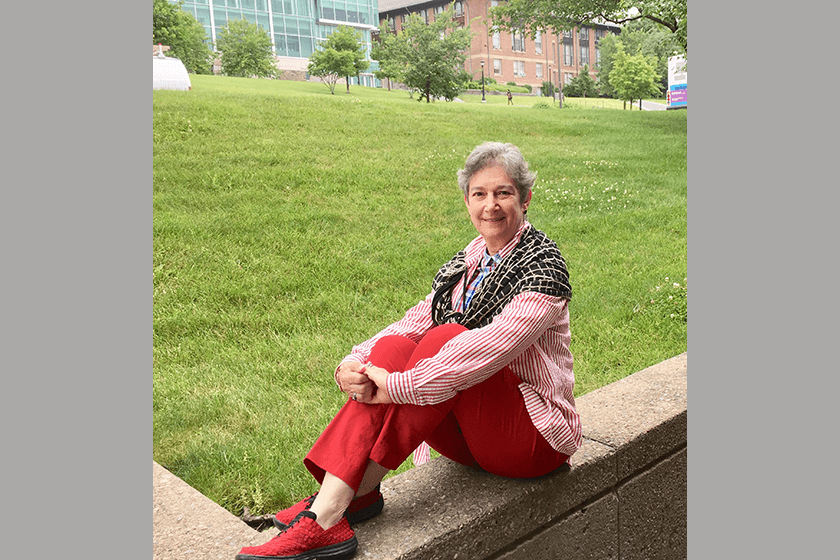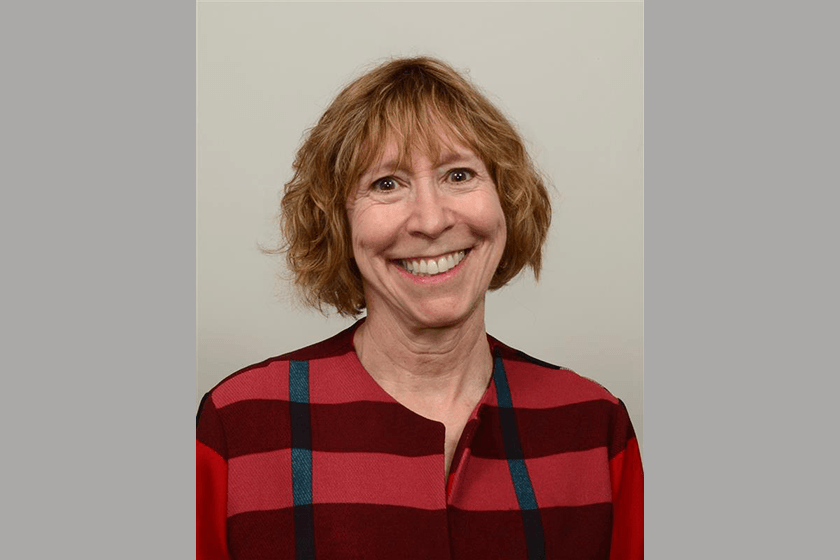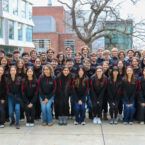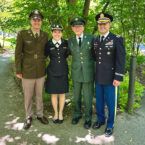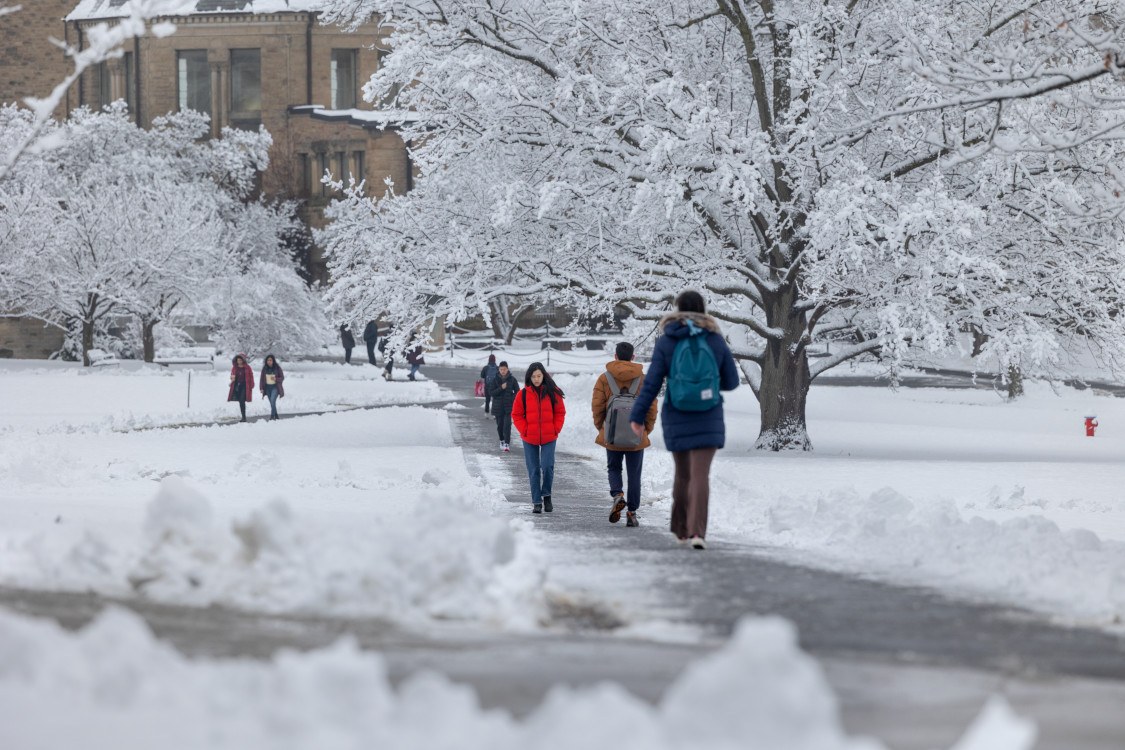When Robert S. “Bob” Harrison ’76 chose to accept his offer of admission to Cornell University, he couldn’t have known how that decision would shape the next five decades of his life. From student trustee to chair of the Cornell Board of Trustees, Bob has helped guide Cornell through some of its most defining moments in recent decades.
Becoming a Cornellian “turned out to be the single biggest, best decision that I ever made,” he said.
Bob began his Cornell journey in 1972, when he was accepted into the College of Arts and Sciences’ college scholar program—now called the Robert S. Harrison College Scholar Program. This opportunity allowed him to create his own course of study focused on personality and politics, with the majority of his courses in the government and psychology departments.
In his free time, Bob joined Sigma Phi fraternity and became a DJ for WVBR FM, hosting the still-running Saturday night oldies request show Rockin’ Remnants. But his most momentous decision was joining university government during his freshman year.
“We essentially became the first campus to create a shared governance model that included students, faculty, and employees,” Bob said, of the Board of Trustees’ expansion in 1970. He joined the newly formed University Senate, was elected speaker, and then was elected as student trustee in his junior year.
After graduation, Bob attended the University of Oxford for two years on a Rhodes Scholarship—an honor he attributes entirely to the mentorship he received at Cornell.
“I wouldn’t have even thought to apply for a Rhodes if it weren’t for conversations that the provost and vice provost had with me, encouraging me to apply,” he said.
From Oxford, he went on to Yale Law School, though he notes his loyalty never wavered. “It’s always been at Cornell,” he said.
“Those two institutions—Cornell and the Rhodes Scholarship—created a trajectory for me in my early twenties to have three very fulfilling careers, to have a wonderful family life, and lifelong friendships. I felt from the day I left Cornell that I had an obligation to give back to a place that had meant so much to me, and it was just a question of how I was going to do it over time,” Bob said.
Bob practiced law with Davis Polk & Wardwell for six years before switching trajectories to become an investment banker. His first day in his new career was an auspicious one: October 19, 1987, also called Black Monday.
“It was the day the stock market collapsed by 22.5% in one day. It was the single largest percentage drop in history, and it still is the single largest percentage drop—and that was my first day at Goldman Sachs,” he said.
Bob spent the next 16 years with Goldman Sachs and left in 2003 to enter public service full-time. He worked on Wesley Clark’s presidential campaign, and then, when the candidate dropped out of the race, Bob worked on John Kerry’s presidential run.
“When he lost to George Bush, I was an unemployed investment banker who was way too young to go play golf for the rest of my life. So I ended up trying to figure out what I wanted to do. I was thinking about a lot of different things, and in that context, I got a call from the Clinton Foundation,” Bob said.
That call led to 20 years with the foundation. Bob worked on a water and sanitation project in the developing world and on a childhood obesity initiative before becoming CEO of the Clinton Global Initiative and joining the foundation’s board. He now serves as interim chief executive of the Clinton Foundation.
While building his extensive resume, Bob steadily deepened his Cornell connections into what could very well be called his unofficial fourth career. Bob joined his class’s Reunion committee for his fifth Reunion and hasn’t missed a Reunion yet. He co-chaired his 25th Reunion Campaign committee and will co-chair again for his 50th Reunion in 2026.
Beyond his class responsibilities, Bob served as a member of the board of directors of Sigma Phi beginning in the 1990s. Not long after, he was asked to join the Cornell University Council. By 2002, the then-current chair of the Board of Trustees, Harold Tanner ’52, called to ask if he would like to run as an alumni-elected trustee. Bob then served as a board-elected trustee before being elected as chair in 2011.
Bob called serving as chair of the Board of Trustees for 10 years the greatest privilege of his life.
“Being able to contribute as a member of the Board of Trustees and then being able to chair the board was an incredible honor and a privilege, because it allowed me to have a real impact on the university,” he said.
In his 22 years on the board, Bob chaired the Executive Committee and the Student Life committee, oversaw the creation of Cornell Tech, helped with the formation of the Cornell SC Johnson College of Business, and guided residential life initiatives—including the launch of the West Campus housing system and North Campus expansion.
Bob also played a key role in five presidential transitions. He participated in the selection of David J. Skorton as president, then helped name Elizabeth Garrett as Cornell’s first female president. After Elizabeth’s untimely death, Bob helped secure interim presidents Hunter S. Rawlings and Michael I. Kotlikoff before guiding the new presidential search that ultimately brought Martha E. Pollack to campus.
“Picking a president is probably the most important thing that the Board of Trustees does,” Bob said.
Bob’s early and unyielding dedication to Cornell volunteer leadership inspired Cornell Alumni Affairs and Development to honor him with the creation of the Robert S. Harrison ’76 Recent Alumni Volunteer Awards. These awards celebrate the service of a new generation of alumni volunteers, who honor Bob’s longstanding dedication to Cornell.
Drawing from his own journey, Bob’s advice to young alumni is to “get involved early and stay connected,” and push back against the common hesitation to wait for an ideal time to start.
“Don’t wait until you’re professionally successful to give back to Cornell,” he said. “A lot of people think that’s the way to do it, to wait till you have saved a significant amount of money, or paid off your debt, or feel like you’re on the right track professionally before you even start to get involved.”
The key, Bob emphasized, is to start small and build over time.
“You can do this very gradually, like I did, getting involved with the Reunions every five years. You don’t have to commit to become chair of the board the year after you graduate,” he added with a smile.


